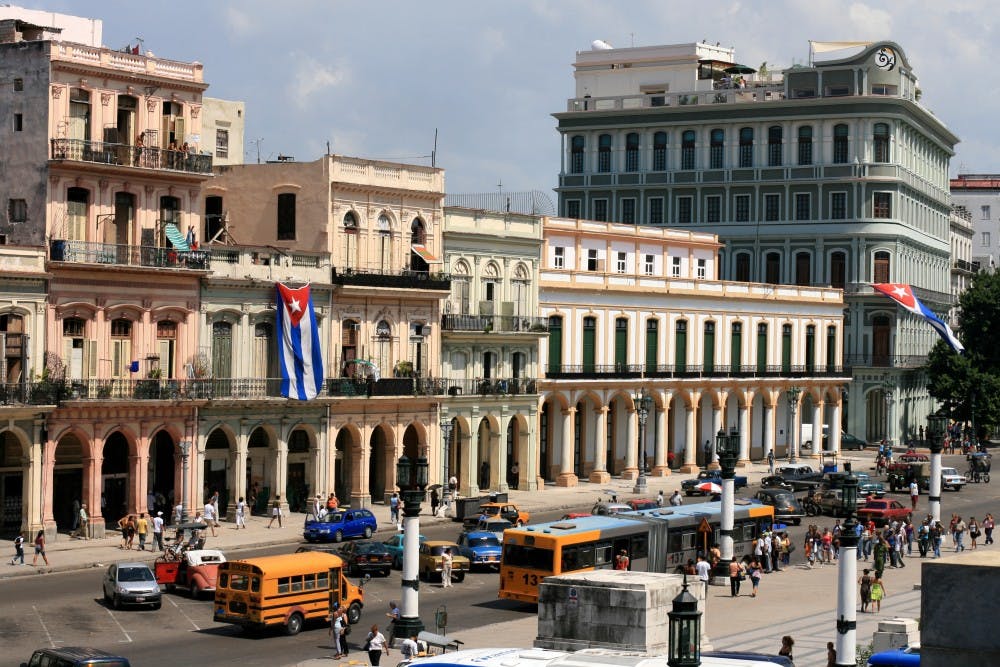
Penn-in-Havana gives students an unconventional learning experience in unique circumstances. | Courtesy of Krestavilis/Wikimedia Commons
Credit: unknownFrom the moment they arrive on campus, Penn students dream of spending part of their college years in Paris, London or Madrid. Not many plan to spend time in a nearby country whose relationship with the United States has been marked by conflict for the past several decades.
But recently, certain students have opted to step out of their — and their country’s — comfort zone. As hostility between the United States and Cuba has declined and travel has become easier over the past few years, students and faculty from all areas of Penn have taken advantage of the opportunity to visit and learn from the country.
American art professor Gwendolyn Shaw spearheaded the Penn in Havana summer program for undergraduate students after visiting Cuba with a group of Penn alumni. Her trip inspired her to take students, the first group of whom traveled to Havana as part of an official Penn summer abroad program last May. The program is currently accepting applications for this summer.
Penn in Havana centers around a class, “Cuban Art and Architecture,” that is taught during the summer on campus. The students travel to Cuba for a week halfway through the course.
However, it’s not a typical abroad program. The students have to bring a week’s worth of spending money in cash, and will be without cellphone service or internet for the whole time. Shaw added that visiting Cuba can be a uniquely jarring experience, even with those inconveniences.
“Cuba is not an easy place to be,” she said. “There’s a lot of poverty and a lot of decay. It’s not a place for someone who’s not emotionally ready. It’s not like going to Jamaica and going to a resort.”
Aaron Levy, who co-teaches the course with Shaw, said he thinks it’s important for the experience to unsettle students in some ways to change their points of view.
“I’m particularly interested in how as citizens, as students and as scholars we can acknowledge and work through the ways we are habituated to think about Cuba and to read Cuba and to judge Cuba,” he said.
Getting to Cuba isn’t easy. Americans still aren’t permitted to travel there purely for tourism, and organizations like religious ministries and educational institutions have to present a specific reason to send individuals. Penn in Havana works through the program People to People. Shaw added that Penn also has a general license to allow staff to do research and students to study abroad. Once students arrive, finding a place to stay can be incredibly difficult without some sort of travel agency or organization that has made prior arrangements.
“The biggest block to increased travel is that there aren’t enough hotels,” Shaw said. “They’ve been raising rates really sharply — they’ve gone up between 10 to 20 percent, and I think it will continue.”
Students are not alone in venturing to the previously off-limits country — Debra Schilling Wolfe, executive director of the Field Center for Children’s Policy, Practice & Research, visited Cuba as part of a group of child welfare experts appointed by the government to study resources for children in the country.
Wolfe said she was pleased overall that the trip went smoothly, attributing it to her research group’s attitude toward the experience.
“It really was important to understand that you’re a guest of a different culture,” she said. “To go to visit any country, you have to be respectful of the values and the culture.”
Oriel Sunyer, a professor in the School of Veterinary Medicine, has engaged in something of an exchange with researchers in Cuba, instead of just visiting. Sunyer met a Cuban scientist who shared his research interests when he traveled to Cuba as a keynote speaker for a conference, and was invited back. Eventually, he said, they plan to send graduate students back and forth between the two labs, if they can finance it.
He said he didn’t run into any problems traveling to Cuba. He wasn’t stopped in either direction, and wasn’t asked his reason for visiting.
“That part is quite normalized as long as you work with an agency that works with the U.S. government that gets you the correct visa,” Sunyer said.
Cuba has drawn Penn’s artists in addition to its researchers. Composer and doctoral candidate Kai-Young Chan was one of ten finalists selected out of 400 composers by the American Composers Forum to attend a contemporary music festival in Havana last November. Chan found it was interesting to hear how different contemporary music is in Cuba than it is in the United States — the festival was attended largely by young local musicians and composers.
“They don’t have access to U.S. scores,” he said. “We heard a lot of European music from the turn of the 20th century.”
Chan’s group didn’t run into any problems besides some last-minute travel confusion when they were in Havana, and had a lot of unstructured time to explore. Now, he said, he’d love to go back.
“I would go back as a tourist to visit different places,” he said. “We only got to go to Havana.”
Correction: this article has been updated to reflect the correct spelling of Kai-Young Chan's name, which was spelled Kai-Young Chen in a previous version.
The Daily Pennsylvanian is an independent, student-run newspaper. Please consider making a donation to support the coverage that shapes the University. Your generosity ensures a future of strong journalism at Penn.
DonatePlease note All comments are eligible for publication in The Daily Pennsylvanian.




